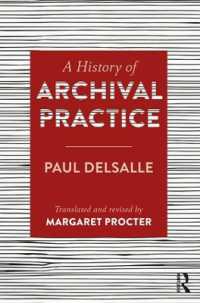- ホーム
- > 洋書
- > 英文書
- > Psychology
基本説明
The traditional field of NDM is extended in this work by focusing on macrocognitive functions other than decision making, namely sense-making, coordination and planning.
Full Description
This book presents the latest work in the area of naturalistic decision making (NDM) and its extension into the area of macrocognition. It contains 18 chapters relating research centered on the study of expertise in naturalistic settings, written by international experts in NDM and cognitive systems engineering. The objective of the book is to present the reader with exciting new developments in this field of research, which is characterized by its application-oriented focus. The work addresses only real-world problems and issues. For instance, how do multi-national teams collaborate effectively? How can surgeons best be supported by technology? How do detectives make sense of complex criminal cases? In all instances the studies have been carried out on experts within their respective domains. The traditional field of NDM is extended in this work by focusing on macrocognitive functions other than decision making, namely sense-making, coordination and planning. This has broadened the scope of the field. The book also contains a theoretical discussion of the macro-micro distinction. Naturalistic Decision Making and Macrocognition will be relevant to graduate students, researchers and professionals (including professionals and researchers in business, industry and government) who are interested in decision making, expertise, training methods and system design. The material may be used in two ways: theoretically, to advance understanding of the field of naturalistic decision making; and practically, to gain insight into how experts in various domains solve particular problems, understand and deal with issues and collaborate with others.
Contents
Contents: Foreword; Part I Orientation: The macrocognition framework of naturalistic decision making, Jan Maarten Schraagen, Gary Klein and Robert R. Hoffman; Mind the gap: a skeptical view of macrocognition, John M. Flach; Technology and 'naturalistic' decision making: myths and realities, Kathleen L. Mosier. Part II The Heartland of Macrocognition: Macrocognition, mental models, and cognitive task analysis methodology, Gary Klein and Robert R. Hoffman; Investigative sense-making in criminal contexts, Thomas C. Ormerod, Emma C. Barrett and Paul J. Taylor; Learning from experience: incident management team leader training, Margaret T. Crichton, Kristina Lauche and Rhona Flin; Making sense of human behavior: explaining how police officers assess danger during traffic stops, Laura A. Zimmerman; Cultural variation in mental models of collaborative decision making, Anna P. McHugh, Jennifer L. Smith and Winston R. Sieck; Athletes, murderers and a Chinese farmer: cultural perspectives on sensemaking, Mei-Hua Lin and Helen Altman Klein; Strategies in naturalistic decision making: a cognitive task analysis of naval weather forecasting, Susan Joslyn and David W. Jones; Supporting macrocognition in health care: improving clinical reminders, Laura G. Militello, Emily S. Patterson, Jason J. Saleem, Shilo Anders and Steven Asch; Macrocognition and experimental learning in surgical teams, Simon Henderson; Macrocognition in systems engineering: supporting changes in the air traffic control tower, Peter Moertl, Craig Bonaceto, Steven Estes and Kevin Burns. Part III Micro-Macro Relationships: Bridging macrocognitive/microcognitive methods: ACT-R under review, Claire McAndrew, Adrian Banks and Julie Gore; Reconceptualizing expertise: learning from an expert's error, Stephen Deutsch; Cognitive engineering based on expert skill: notes on success and surprises, James J. Staszewski. Part IV Alternative Approaches: Representation of spatio-temporal resource constraints in network-based command and control, Rogier Woltjer, Kip Smith and Erik Hollnagel; Situated cognitive engineering for complex task environments, Mark A. Neerincx and Jasper Lindenberg; Indexes.







